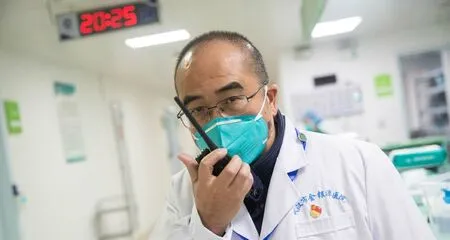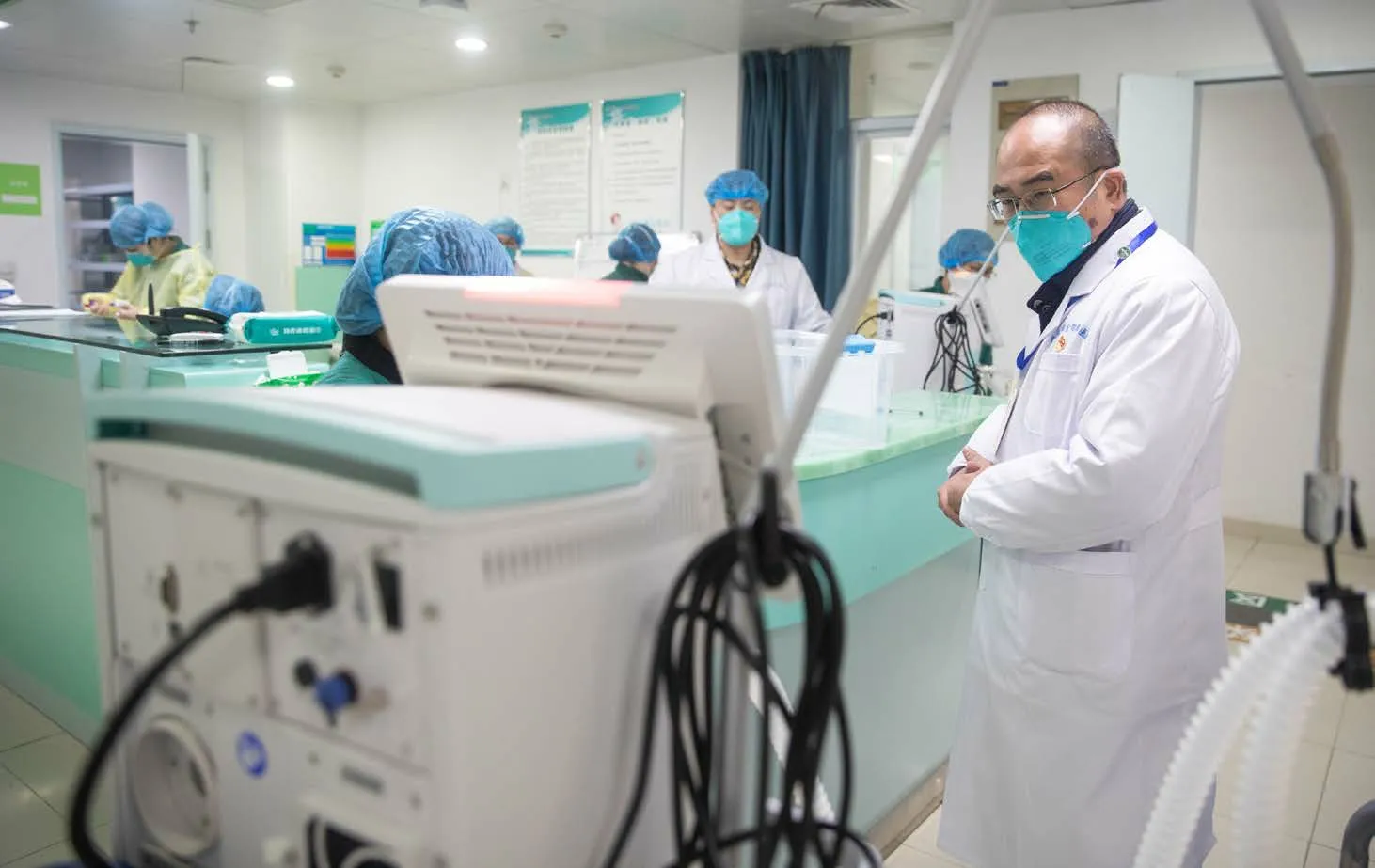A Race Against Fate and Coronavirus—Story of Zhang Dingyu, President of Jinyintan Hospital
2020-07-07ByTangXiaoanLiMoWuChunxin
By Tang Xiao’an, Li Mo & Wu Chunxin
Perhaps there is no Superman coming to save Zhang Dingyu, a 57-year-old doctor with an incurable disease. But over the past month, he has become a Superman for many people in Wuhan, the center of the novel coronavirus outbreak.
Zhang Dingyu is the president of Wuhan Jinyintan Hospital, one of the city’s designated hospitals to admit patients infected with the new virus. He has spent the past 30 days treating patients since the first COVID-19 patients arrived at his hospital.
Zhang knows his clock is ticking. With amyotrophic lateral sclerosis (ALS), he will progressively lose muscle strength and eventually become paralyzed and unable to speak, move, swallow or breathe. His legs have recently been rendered powerless. He has to clutch at the handrail as he slowly makes his way up and down the stairs.
As president of the Hospital, one of the major battlefields of the epidemic, Zhang and his hundreds of colleagues have been on the frontline fighting against the novel coronavirus, and racing against time to treat critically ill patients.
我必须跑得更快,才能跑赢时间;我必须跑得更快,才能从病毒手里抢回更多病人
1月26日,大年初二。
自2019年12月29日转入首批7 名新型冠状病毒感染的肺炎患者以来,武汉市金银潭医院600 多名医护人员,已在抗击疫情的最前沿奋战了29 天。
这里是武汉最大的专科传染病医院,目前收治的全是转诊确诊患者。
晚上9 时,57 岁的院党委副书记、院长张定宇带着疲惫,一瘸一拐走向我们。手机铃声处,是他在接打电话,整个走廊都能听到他在喊。我们默默地数着,到张院长跟我们握手时,他已经接打了6 个电话。
“全院都晓得我性子急、嗓门大。”张定宇笑着为自己打圆场,“性子急,是因为生命留给我的时间不多了。”他沉默了一会儿,平静地提起那个埋在心里的秘密:“我是一个渐冻症患者,双腿已经开始萎缩,全身慢慢都会失去知觉。我必须跑得更快,才能跑赢时间,把重要的事情做完;我必须跑得更快,才能从病毒手里抢回更多病人。”

In the Comprehensive Building of Wuhan Jinyintan Hospital, Zhang Dingyu talking on the walkie talkie (Photo by Ke Hao)在武汉金银潭医院综合病区楼,张定宇在联系协调工作(柯皓 摄)
在疫情中“逆行”的29 天里,张定宇往往凌晨2时刚躺下,4 时就得爬起来,接无数电话,处理各种突发事件。就在他日夜扑在一线,为重症患者抢出生命通道时,同为医务人员的妻子,却因新型冠状病毒感染,在十几公里外的另一家医院接受隔离治疗。
身为共产党员、医务工作者,非常时期、危急时刻,必须坚决顶上去
1月24日,除夕夜。
当晚,张定宇接到通知,解放军陆军军医大学150 人医疗队和上海136 名医疗队都将奔赴金银潭医院。张定宇和团队受到极大鼓舞。“近一个月,医护人员严重不足。日常状态下,护士2 小时交接班一次,现在需拉长至四五小时,医生就更辛苦,严重的体力透支也会增大感染风险。”安顿完医疗队住下,已过凌晨3 时。日历已悄然翻到1月25日,中国年的大年初一。
1月26日,两支医疗队成建制接管该院四个病区,截至晚11 时,接收53 名转诊患者。
“还有一批病人要连夜转过来,估计今天要达到70 多人。”张定宇从会议室的窗户望出去,不远处的南楼、北楼和综合楼,21 个病区,灯火通明,650 多名感染者在这里接受治疗。
火线48小时,张定宇兵不卸甲、马不停蹄。“身为共产党员、医务工作者,非常时期、危急时刻,必须不忘初心、勇担使命,坚决顶上去!”张定宇对我们说,全院240多名党员,没有一个人迟疑、退缩,全部挺在急难险重岗位。“有国家强大的动员能力、科技研发实力和雄厚的经济实力,广大党员干部群众众志成城,疫情终将被我们战胜!”张定宇双眼布满血丝,但眼神坚毅而沉着。
传染病不是绝症,当前我们最需要的,是消除恐惧
2019年12月,武汉部分医疗机构陆续出现不明原因肺炎病人,引起张定宇的高度警惕。
当月29日,首批7 名不明原因肺炎患者转入金银潭医院,该院开辟专门病区。
凭着多年在传染病领域的临床经验,张定宇感觉这个病不简单。他一边叮嘱医务人员加强防护,一边带领大家采集这7 名病人的支气管肺泡灌洗液,并送往武汉病毒所进行化验。“为什么要采集肺泡灌洗液?因为我们发现,一些病人在做咽拭子检测的时候是阴性,但病情却在持续加重,肺部CT 异常,我们怀疑病毒已通过下呼吸道进入肺泡,果不其然。”张定宇说,病毒躲在肺泡里,咽喉检查根本不起作用,但究竟这是一种什么病毒,谁也不知道。后来,科学家团队从分离样本中,确认这是一种新型冠状病毒。

On the evening of January 27, Zhang Dingyu coordinating the transfer of critically ill patient (Photo by Ke Hao)1月27日晚,张定宇协调危重病人转运(柯皓 摄)
In the past week, Zhang went to bed at about 2 am and got up at about 4 am. This has become the 57-year-old doctor’s daily routine.
“I have never encountered such pressure as today,” Zhang said. “For me, ALS is like a sword hanging over my head. I want to make a contribution with the limited time I have left. I try to outrun death, saving time and indeed more patients.”
He added that he has to quicken his pace.
His wife, also a medical worker, was infected with the novel coronavirus and was hospitalized on January 19. Luckily, after medical treatment, she has now recovered.
On December 29, it was foggy in Wuhan, a big city with a population of over 10 million in central China’s Hubei Province. The first batch of seven patients infected with coronavirus were transferred to Zhang’s hospital.
Zhang, an expert in infectious diseases, was on high alert in December when some cases of pneumonia with an unknown cause began to be reported at hospitals in Wuhan. When the first seven patients arrived, the Hospital immediately set aside two separate areas for around 80 patients.
However, the situation was even worse than he imagined. On the second day, he decided to allocate more medical resources and separate wards for more infected patients.
Jinyintan Hospital, a once little-known hospital in Wuhan, has been scented with the odor of disinfectant and undercurrent of uneasiness. The sound of call bells never stopped.
The sense of urgency made Zhang even more short-tempered than usual. He demanded doctors and nurses answer his questions about patients quickly and accurately.
面对新的病毒,没有疫苗,也没有特效药,大家都在试。治疗中,该院医护人员发现,他们以往用于抗艾滋病的药物“克力芝”,对新型冠状病毒有一定疗效。同时,从一个轻症患者居家隔离自愈过程判断,提高人体免疫力非常重要。
张定宇说:“传染病不是绝症,当前我们最需要的,是消除恐惧。”
我很内疚,我也许是个好医生,但不是个好丈夫
张定宇的双腿越来越不给力了,上下楼时,腿跟冻住了一样。但每每有人问他腿怎么了,他都摆摆手搪塞说:“我膝关节不好。”全院没有一个人知道,他一瘸一拐的脚步,缘于渐冻症的折磨。
这是一种罕见的绝症,又称肌萎缩侧索硬化(ALS),无药可治。早期,患者可能只是感到有一些无力、痉挛、容易疲劳。渐渐地,就会进展为全身肌肉萎缩和吞咽困难,直至产生呼吸衰竭。张定宇不告诉别人,是怕影响工作。
他微笑着把身体蜷缩在椅子里说:“你看我现在长得五大三粗,慢慢地,我会像这样缩成小小的一团。每个渐冻病人,都是看着自己一点一点消逝的。”他说,“如果你的生命开始倒计时,就会拼了命去争分夺秒做一些事!”
当我们问到妻子被感染的事情时,这位硬汉忽然湿了眼眶。
“有天下班我回得很晚,跟爱人谈起院里病人的情况,说发病的时候会很喘。她说,我也觉得有些喘。”第二天,她悄悄去医院检查,确诊已被感染,随后入院。张定宇的爱人在武汉市第四医院工作,也在疫情防控一线。
分身乏术的张定宇,有时忙得三四天都顾不上去看一眼妻子。“我很内疚,我也许是个好医生,但不是个好丈夫。我们结婚28年了,我也害怕,怕她身体扛不过去!”
愿用渐冻的生命,与千千万万白衣卫士一起,托起信心与希望
在金银潭医院北楼五病区主任魏明眼中,张定宇急性子,办事雷厉风行,一旦有困难向他反映,他会想方设法,立即解决。“我们这个病区刚开时很缺人手,我一急就给张院长打电话,他马上带着护理部、后勤科室人员来现场办公。”
从武汉市第四医院副院长,到武汉血液中心主任,再到6年前出任金银潭医院院长,张定宇的白大褂一穿就是几十年。在抗疫一线,他临危受命。在灾情关头,他冲锋在前。
1997年11月,张定宇曾响应国家号召,随中国医疗队出征,援助阿尔及利亚。
2008年5月14日,四川汶川地震第三天,张定宇就带领湖北省第三医疗队出现在重灾区什邡市,全力抢救伤员。
2011年除夕,张定宇在巴基斯坦西北的蒂默加拉医院度过,他是湖北第一位“无国界医生”。那天凌晨,他被一阵电话铃声唤醒。一名产妇子宫破裂出血,需紧急抢救。匆匆赶到手术室,做麻醉,稳定病人血液循环。不到30 分钟,一个男婴呱呱坠地。紧接着,第二台剖宫产病人转到手术台,张定宇紧急给产妇做局部麻醉,20 多分钟,又一个新生命诞生。时间已是凌晨4 时15 分。刚换下工作服,又有一位产妇胎盘早剥、出血,需要紧急剖宫产。输液、给氧、麻醉、手术……胎儿终于降生了,却没有心跳。他迅速采取心脏按压、吸引、气管插管、给氧,一阵忙碌后,手术室里又一次响起了婴儿的啼哭声。
这样一位施恩于人、充满大爱的白衣卫士,却总把“感恩”二字挂在嘴边。
“很感激解放军和上海医疗队的分担,让我这两天凌晨1 点就能躺下了,之前有时候得扛到三四点才能睡。”
“我爱人虽然感染了病毒,但是很幸运,给她用了抗毒药之后,有效果,我很感恩。”
“这样的疫情和灾难,发生在其他任何一个国家,后果都不可想象。我很感恩,当我们为了抢救病人不顾一切,背后支撑我们的,是整个中国。”
疫情还没发生前,有空的时候,张定宇会去徒步。他说,我很珍惜还能走路的时间。

On February 18, Cheng Lin, wife of Zhang Dingyu, comes to Jinyintan Hospital to donate plasma. Cheng Lin (second from the right) takes a photo with the medical staff after donation2月18日,武汉市金银潭医院院长张定宇的夫人程琳来到金银潭医院捐献血浆。程琳(右二)在捐献后与医护人员合影留念
而眼下,他要与命运叫板,在抗击疫情的最前沿,用渐冻的生命,与千千万万白衣卫士一起,托起信心与希望,托起无数人的生命与健康。
“Otherwise he will scold you without mercy,” said Zhang Li, head of a ward in the hospital. “But thanks to his resolute and daring action, medical staff in our hospital are willing to turn to him whenever they face challenges because shorttempered Zhang will figure out a solution.”
On January 23, China locked down Wuhan in an unprecedented effort to curb the spread of the new infectious disease. The city has been at the center of a storm sweeping across the nation.
As one of Wuhan’s designated hospitals to admit patients infected with the new virus, Jinyintan mainly accepted critically ill patients. By 10 am Sunday, the hospital had 581 novel coronavirus patients including more than 200 in serious and critical condition.
On January 24, the eve of the Chinese New Year, 150 medical workers from Army Medical University in Chongqing were sent to the hospital to support its staff.
Till then, Zhang has been on duty every day since December 29.
Zhang never revealed the state of his own illness to his colleagues after he was diagnosed with ALS in 2018. He lied to them, saying he had undergone a knee operation. However, more and more colleagues noticed his strange way of walking down the stairs. He finally admitted his illness after constant inquiries.
“When I first came to know I was a rare disease patient, I was very scared,” Zhang said. “You love life, but imagine one day being told that you don’t have long to live.”
Zhang has researched medical materials about ALS. “I will live another 5 to 10 years, perhaps. Nobody knows. This is why I especially cherish every minute I have, taking a walk, soaking myself in the sunshine or working along with my colleagues,” he said.
Zhang’s illness has touched a nerve for many colleagues. Jia Chunmin, a head nurse in the hospital, couldn’t believe it.
“He actually walks very fast,” she said, recalling Zhang once called her to arrive in a new ward in five minutes. Hanging up the phone, Jia ran fast to the ward, only to find Zhang was already there although his office was farther than hers.
“No one can keep up with him in the battle against the new virus,” Jia said.
In many cases, he sleeps no more than two hours before being woken amid a stream of emergency calls.
After working around the clock for 22 days, Zhang received the bad news that his wife was diagnosed with the novel coronavirus while working at another hospital in Wuhan.
Only after three days of his wife being hospitalized did Zhang find time to visit her, and he only stayed for 30 minutes.
“I feel very guilty. Perhaps I am a good doctor, but not a good husband,” Zhang said. “We have been married for 28 years. I was afraid of losing her.”
Luckily, after medical treatment, Zhang’s wife has now recovered.
It was not the first time for Zhang to stand on the front line over the past 33 years.
In 2008, he led a medical team from Hubei to help victims in southwest China’s Sichuan Province after the devastating Wenchuan earthquake. He was once a member of a Chinese medical team assisting Algeria. In 2011, he worked in a hospital in Pakistan to help local patients.
After the interview, he turns around and hobbles toward the isolation wards, slowly but surely, hoping to outpace the spread of the new virus while he is still able to move.
“Every life has an end. It is a normal thing. We need to accept it and bravely face the reality.” This is what he always says to his family. (Source: Xinhua News Agency & China Daily)
猜你喜欢
杂志排行
Special Focus的其它文章
- Marvelous Medical Staff—A Cameroonian student shares his experience of recovering from novel coronavirus in China
- Wuhan Battle Against COVID-19 in Retrospect
- Days of an Italian Professor Fighting Against Coronavirus
- “Iron Men” with Hearts of Gold
- International Students: Quarantine Days in Wuhan
- Our Wuhan Memories
